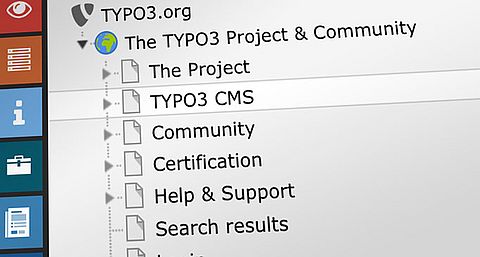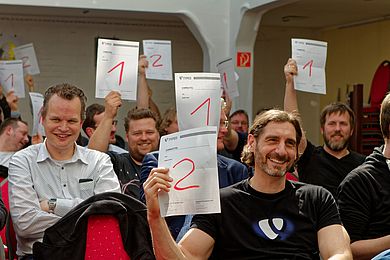 From within CWG we initiated a hangout with <link http: www.ashedryden.com>Ashe Dryden to get some input on how to increase diversity, be inclusive and at the same time spread TYPO3. Ashe is an activist from the US and spends the majority of her time educating people about the lack of diversity in tech. Ashe is writing a book called '<link https: leanpub.com the-diverse-team>The Diverse Team' subtitled 'Healthy Companies, Progressive Practices'. To quote ashe herself:
´I am making the world better by facilitating conversations about diversity, inclusivity and social justice in the hopes of promoting empathy and equality within the tech community.'
I connected to the hangout from the <link http: www.t3uxw.org>User eXperience Week in the middle of the Harz. This is significant in the context of this hangout as the organisers have diversity on their mind and did sessions on the topic on earlier occasions. The event in Oberharz had 33% women, which is unmatched by any preceding event. So we are not doing bad, but we can do better overall.
The TYPO3 community is pretty homogenous in its structure with the keywords: developer, german, white, male. In our conversation with Ashe we touched on how to get out of these stereotypical definitions. Outreach is the keyword to get out of any predicament. In order for outreach to be effective, actively approaching people is important. More focus could be shifted to people in areas where the community is not so well spread. And do not only mean geographically. Asking people with expertise in a certain area, besides the typical core topics, to talk at conferences and event, also helps spread our community.
The biggest takeaway from the hangout with Ashe is that in order to have more diversity you need outreach. Outreach itself does not mean showing you are open, but being open. Publishing articles and asking people for feedback only works for a minority. Outreach is very much connecting to people and asking them to join your project or a specific task. Enabling people to act on behalf of your project is very powerful.
The language barrier we have or what we sometimes call 'the language prison' is a prominent issue in the community and needs extra attention. In our conversation we do recognize that carrying our conversation in English is necessary to spread TYPO3.
Lowering the barriers for participation is another topic we dealt with. Setting up a dedicated IRC channel for women is one thing and having open office hours on regular recurring times is another suggestion to be taken into consideration.
In the last place we discussed the Code of Conduct that should be used for mailing lists and IRC channels as well.
Being inclusive and achieving more diversity is not done overnight and requires a new mindset. Culture isn't dictated, but lived.
Changing a culture requires constant tiny adjustments. It's not just about showing people you're open, but actively encouraging positive, wanted behavior; it's about injecting those thoughts and beliefs into discussions and events to make people aware of what is expected. It's about modelling expected behavior.
From within CWG we initiated a hangout with <link http: www.ashedryden.com>Ashe Dryden to get some input on how to increase diversity, be inclusive and at the same time spread TYPO3. Ashe is an activist from the US and spends the majority of her time educating people about the lack of diversity in tech. Ashe is writing a book called '<link https: leanpub.com the-diverse-team>The Diverse Team' subtitled 'Healthy Companies, Progressive Practices'. To quote ashe herself:
´I am making the world better by facilitating conversations about diversity, inclusivity and social justice in the hopes of promoting empathy and equality within the tech community.'
I connected to the hangout from the <link http: www.t3uxw.org>User eXperience Week in the middle of the Harz. This is significant in the context of this hangout as the organisers have diversity on their mind and did sessions on the topic on earlier occasions. The event in Oberharz had 33% women, which is unmatched by any preceding event. So we are not doing bad, but we can do better overall.
The TYPO3 community is pretty homogenous in its structure with the keywords: developer, german, white, male. In our conversation with Ashe we touched on how to get out of these stereotypical definitions. Outreach is the keyword to get out of any predicament. In order for outreach to be effective, actively approaching people is important. More focus could be shifted to people in areas where the community is not so well spread. And do not only mean geographically. Asking people with expertise in a certain area, besides the typical core topics, to talk at conferences and event, also helps spread our community.
The biggest takeaway from the hangout with Ashe is that in order to have more diversity you need outreach. Outreach itself does not mean showing you are open, but being open. Publishing articles and asking people for feedback only works for a minority. Outreach is very much connecting to people and asking them to join your project or a specific task. Enabling people to act on behalf of your project is very powerful.
The language barrier we have or what we sometimes call 'the language prison' is a prominent issue in the community and needs extra attention. In our conversation we do recognize that carrying our conversation in English is necessary to spread TYPO3.
Lowering the barriers for participation is another topic we dealt with. Setting up a dedicated IRC channel for women is one thing and having open office hours on regular recurring times is another suggestion to be taken into consideration.
In the last place we discussed the Code of Conduct that should be used for mailing lists and IRC channels as well.
Being inclusive and achieving more diversity is not done overnight and requires a new mindset. Culture isn't dictated, but lived.
Changing a culture requires constant tiny adjustments. It's not just about showing people you're open, but actively encouraging positive, wanted behavior; it's about injecting those thoughts and beliefs into discussions and events to make people aware of what is expected. It's about modelling expected behavior.
T3CON Recap—TYPO3 CMS & AI: Three Snapshots of AI-Powered Content Management
AI will change content management forever. At T3CON23, speakers demonstrated AI-powered CMS features far beyond text and image generation.




